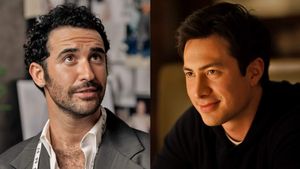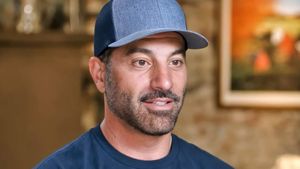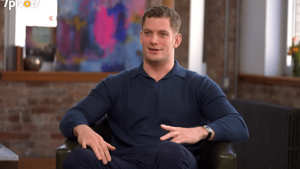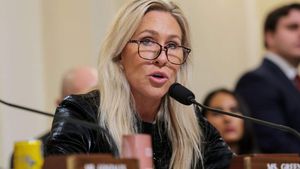CONTACTAbout UsCAREER OPPORTUNITIESADVERTISE WITH USPRIVACY POLICYPRIVACY PREFERENCESTERMS OF USELEGAL NOTICE
© 2025 Equal Entertainment LLC.
All Rights reserved
All Rights reserved
By continuing to use our site, you agree to our Privacy Policy and Terms of Use.
We need your help
Your support makes The Advocate's original LGBTQ+ reporting possible. Become a member today to help us continue this work.
Your support makes The Advocate's original LGBTQ+ reporting possible. Become a member today to help us continue this work.
The other night I saw a brilliant 25th anniversary reading of Larry Kramer's The Normal Heart. This play is not only a powerful historical tragedy, but timely. It directly and indirectly addresses the costs of prejudice and internalized prejudice, looking at hatred and self-hatred and the cost therein of countless lives.
One of the motivations for this column is to look at ageism and internalized ageism. Society's prejudices are everywhere. We absorb them, subtly or not so subtly ... we build up belief systems about ourselves based on what we are exposed to and experience. Sadly, we often buy into the idea that we are "less than" because of something we are: This is internalized prejudice.
It can be truly insidious, and the good news is that we have a great deal of influence on its healing, since it's about a change in our own perceptions, not about changing others.
I doubt that any of us are without some level of internalized homophobia, racism, classism, AIDS phobia, sexism, or whatever applies to us.
For example, the first time I led a workshop on this subject, as preparation a colleague and I asked ourselves, "Where am I operating out of internalized prejudice?" After a pause, she laughed and said, "Even though my mother knows I'm gay and loves my long-term partner, whenever I go to visit I pack my most feminine clothes ... and always wonder why I feel like I have nothing to wear!" Then it was my turn. To my surprise, what came up was not about my sexuality or HIV status: "When people say to me that they don't think I'm Jewish, I have always taken it as a compliment." This is my internalized anti-Semitism. I know where it comes from. My grandmother's family prided themselves on their ability to "pass" as gentile and to secure jobs that Jews couldn't get in early-20th-century America. Passing is a telltale sign of internalized prejudice.
In the face of virulent prejudice and bigotry there is often real danger: gay bashings, prosecution, job loss, etc. I am not suggesting that people put themselves in harm's way. However, we are often reacting emotionally as if we are in danger when actually we are in a very safe environment.
In workshops, participants often ask how we can let go of internalized prejudice. The first step is always discovery, followed by observation. For example, within months of discovering my internalized anti-Semitism, more than one friend said to me, "You are acting 'more Jewish' than you used to."
When asked what they meant by this, they
said I was using more Yiddish, talking about my European maternal
grandparents, and even speaking dialect when telling a joke. I was
thrilled and fascinated. The act of discovery had begun a change in my
perspective as evidenced in my behavior. It can be that simple ...
The list of internalized prejudices is as broad as prejudice itself. Why it matters:
Internalized
homophobia can lead to isolation, being in the closet, even suicide.
We are all role models of surviving childhood and the often difficult
teen years. It is important to be outspoken about the good things about
being older, gay, Jewish, Muslim, of color, etc. Most of our young
people are not hearing enough positive statements about what they are
now -- or eventually will be.
AIDS phobia causes too many people to
not be tested for HIV. At Friends in Deed, I still work with men and
women who had developed AIDS before testing. Their beliefs
about HIV stigma endanger their health and well-being. Ignorance is
bred by fear and reinforced by internalized shame.
Most of us
have significant degrees of internalized ageism. Except for 20-year-olds, most of us are delighted to hear that we look 10
years younger than our numerical age. Famously, when Gloria Steinem
turned 40 and was barraged with "You don't look 40," she
responded with "This is what 40 looks like."
We can fight
ageism by telling the truth about our age and gently reminding everyone,
including ourselves, that this is what 40, 50, 60, 80
looks like. My dear friend Joe is 90, and within the past year he
has traveled to Europe and Asia, on his own. He is one of my
inspirations for aging with style.
Back in 1985, The Normal Heart was prescient about ways that our self-esteem is undermined,
making a case for gay marriage, addressing teen suicide, and even
referring to gays in the military. We have an obligation to continue to
speak out and act whenever the seeds of internalized prejudice are
being planted or fertilized. It's a matter of life and death. However,
let's not only survive, let's thrive as who and what we are. This is
our gift to the world.
From our Sponsors
Most Popular
Bizarre Epstein files reference to Trump, Putin, and oral sex with ‘Bubba’ draws scrutiny in Congress
November 14 2025 4:08 PM
True
Jeffrey Epstein’s brother says the ‘Bubba’ mentioned in Trump oral sex email is not Bill Clinton
November 16 2025 9:15 AM
True
Watch Now: Pride Today
Latest Stories
Six key takeaways from Trump's speech to the nation, including 'transgender for everybody'
December 17 2025 10:51 PM
Marjorie Taylor Greene’s bill criminalizing gender-affirming care for minors passes with Democrats’ support
December 17 2025 6:47 PM
True
I didn’t just run the world’s major marathons. I changed them
December 17 2025 4:31 PM
Pam Bondi wants FBI to offer bounties for ‘radical gender ideology’ groups, leaked memo shows
December 17 2025 3:17 PM
Rock Hudson had a 'legendarily large penis,' Armistead Maupin says
December 17 2025 3:05 PM
California councilmember blames daughter becoming a lesbian on sexual trauma
December 17 2025 2:26 PM
California hospital will continue youth gender-affirming care after families protest
December 17 2025 11:18 AM
Tennessee whistleblower says library board chair sought private data as part of state's book purge
December 17 2025 7:00 AM
Lesbian federal worker pleads for answers about wife trapped in immigration detention limbo
December 16 2025 5:08 PM
Michigan Republican U.S. Senate candidate Mike Rogers surrounds himself with hardcore LGBTQ+ rights opponents
December 16 2025 2:53 PM
True




































































Charlie Kirk DID say stoning gay people was the 'perfect law' — and these other heinous quotes